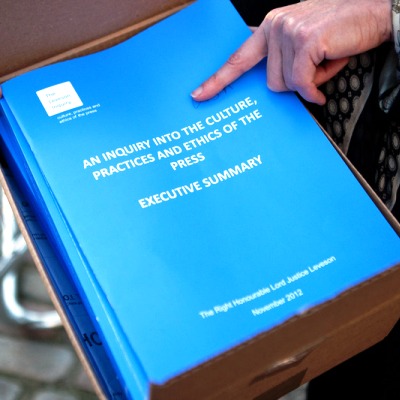 The industry’s proposal for a new press regulator is not perfect. But it’s a starting point for proper discussion on the future of Britain’s free press, says Padraig Reidy
The industry’s proposal for a new press regulator is not perfect. But it’s a starting point for proper discussion on the future of Britain’s free press, says Padraig Reidy
This week sees two developments in the increasingly obscure regulation debate. On Wednesday, the Privy Council meets to discuss the newspapers’ proposal for a Royal Charter on press regulation. Despite former Deputy Prime Minister John Prescott’s resignation from the Council in protest at the fact the industry charter is being considered before the government’s proposition, the meeting is largely being cast as a formality. Interestingly, the Privy Council meeting will only be attended by serving cabinet ministers, undermining the notion that the Royal Charter will be free from politics.
Yesterday, the newspapers (with the exception of the Independent, the Guardian and the Financial Times) published their vision of a future regulator: The Independent Press Standards Organisation.
Index has always been clear: we support strong independent self-regulation, but resist the creation of any statute, or statutory body, relating specifically to the press. We are not alone in this view: Campaigners and journalists from around the world have expressed disquiet at the potential for press regulation in Britain, pointing out that once the principle is established in the UK, it will prove difficult to argue for a free press elsewhere.
But there is also the simple principle in itself. As Index CEO Kirsty Hughes said this week: “A free press should not have a shadow of political interference hanging over it. A new robust press regulator must be independent and address issues of standards and mediation, as well as complaints. This cannot be achieved if the body that oversees a press regulator is determined by the Privy Council. There must be no statutory underpinning, if the press is to be free to hold people in power to account.”
In spite of a strong reaction from Hacked Off campaigners, there’s not a great deal that’s hugely controversial about the IPSO regulation proposal. The regulator is proposed to only cover the “traditional” print media and associated websites, perhaps attempting to sidestep the contortions the Department of Culture, Media and Sport got involved in over definitions of blogs and publishers of “news-related material”. It certainly does try to give the industry more influence over the decisions of the regulator — with a board made up of seven “independent” members (including the chair) and five press representatives (with a spread of experience across nationals, locals, etc).
The regulator would have investigatory and fining powers, and would accept complaints from third parties (this is quite a big concession, even with the caveat that it could dismiss vexatious complaints).
A lot of work has obviously gone into this comprehensive proposal. Culture Secretary Maria Miller, though reported not to be a particular fan of the industry’s Royal Charter proposal, has congratulated the papers on their work. The refuseniks at the Guardian, Independent and FT have also indicated a willingness to engage.
Of those papers, the editors of the Guardian and the FT recently recommended the idea that Michael Grade be brought in to chair negotiations on regulation. Grade is well respected and experienced (in the spirit of transparency, he is also a former chair of Index on Censorship: we do not know whether his personal position on press regulation in any way coincides with that of Index today). The suggestion fell by the wayside, amid furious denouncement by Hacked Off, who accused the Guardian of appearing “ready to surrender to the manipulations of press corporations responsible for many of those abuses” merely for suggesting that negotiations might be a good thing.
Now that we have a solid negotiating point at least on the shape of the regulator — rather than the regulator of the regulator, which is the purpose of the Royal Charter, perhaps it is time that idea was revived.
There is a fear of stalemate on all sides of this discussion. Hacked Off and allies are wary of a loss of momentum for their cause, while some on the anti-regulation side feel that a deal must be done before fresh Operation Elveden trials begin in the autumn, lest there be a whole new wave of revelations turn the public against the press again.
With that in mind, surely it is in the interests of all concerned that the industry’s regulation suggestion be discussed properly, and soon. A proper settlement could see off the spectre of state regulation.




